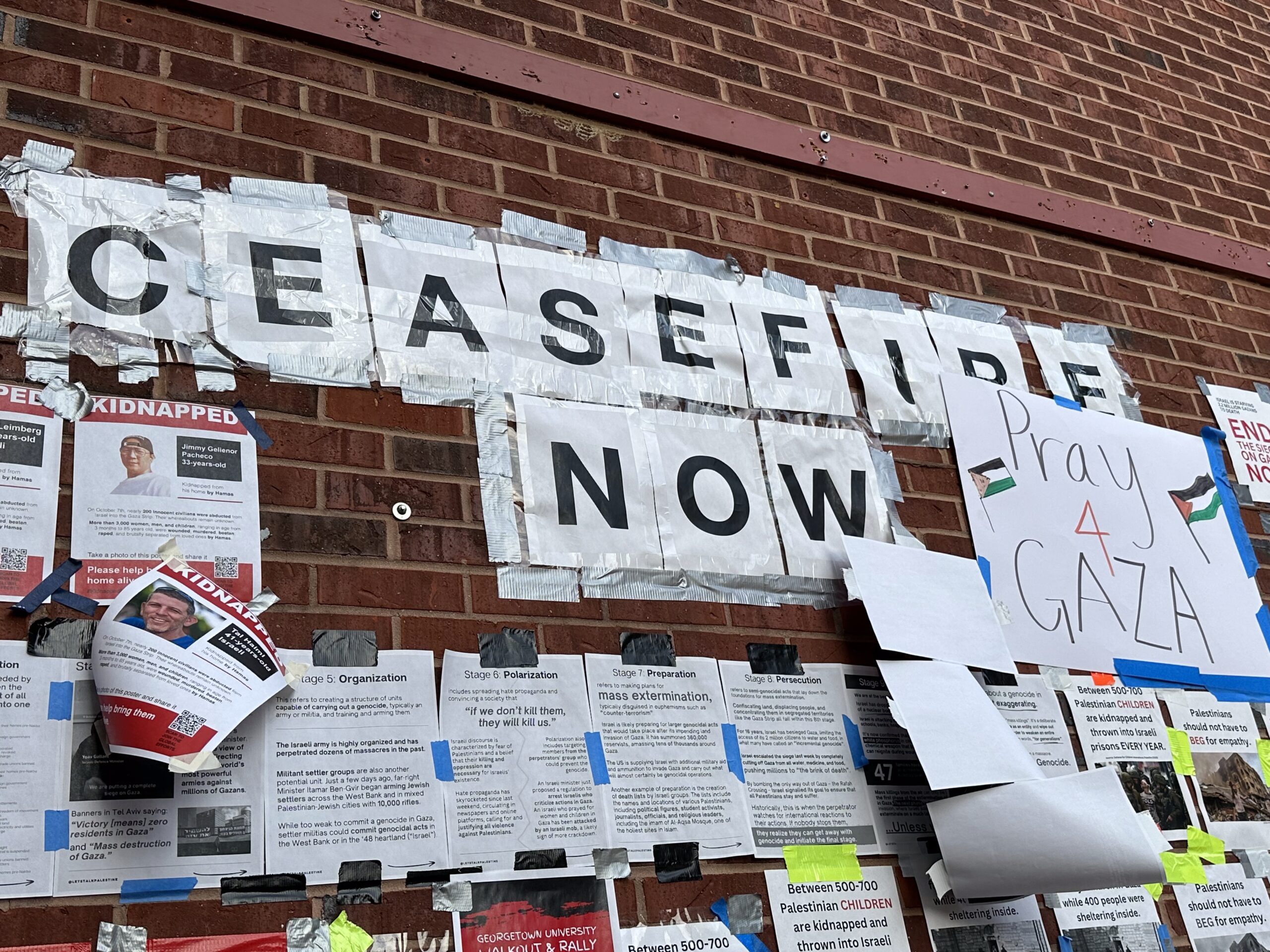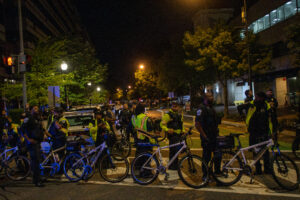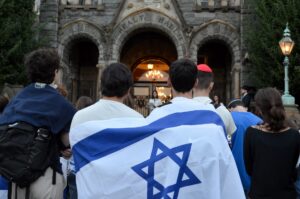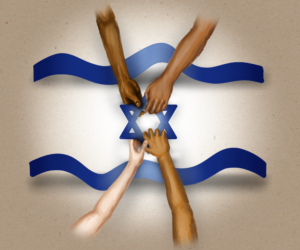This article does not include names for the personal safety of Georgetown students and faculty.
A walkout for Gaza organized by Georgetown Students for Justice in Palestine (SJP) drew several dozen Georgetown students and faculty to Red Square on Oct. 26. Holding handmade signs and dressed in keffiyeh, black-and-white scarves symbolic of the Palestinian liberation movement, protesters gathered around a group of SJP-organized speakers that included Georgetown students and professors to call for action from university administration.
“We need to call it what it is. We need to stop being afraid to use the word we are seeing,” a student speaker began, highlighting the rapidly rising death toll in Gaza. “This is not a war, this is genocide.”
Since Oct. 7, over 10,000 Palestinians have been killed by Israeli attacks, according to Gaza’s Ministry of Health.
The protest aimed to demand accountability from university administration for its silence on Israel’s crimes against humanity in Palestine, call for divestment from occupation-supporting companies, and call for an immediate ceasefire , according to a statement from SJP.
SJP’s walkout was part of a series of student-led actions in recent weeks, as many express frustration over university messaging in regard to the situation in Israel and Palestine. In an Oct. 8 email condemning Hamas’s Oct. 7 attack on Israel and mourning the loss of Israeli lives, President John DeGioia did not mention Israel’s retaliatory attacks on Palestine nor the loss of Palestinian lives, an omission students and faculty have argued willfully ignores the decades of Israeli occupation that preceded the current outbreak of violence.
“Incumbent upon the breath that decries violence towards innocent civilians is the condemnation of Israel’s deplorable war crimes and illegal collective punishment against the Palestinian people for the past 75 years,” an Oct. 10 SJP statement reads.
A group of students—both SJP and non-SJP affiliated—with personal connections to Palestine organized a meeting with DeGioia on Oct. 15. In this meeting, they asked the president to release a new statement recognizing the humanity of Palestinians and apologizing for the harm caused by his first statement. According to students in the meeting, DeGioia acknowledged their concerns but did not promise any concrete action.
On Oct. 18, students held a small rally outside Healy Hall, promising to start sit-ins if the president did not release a revised statement by the end of the week. At this rally, a Palestinian resident minister asked for university administrators’ empathy, saying that the Palestinian community “just wants to be treated like everyone else.”
On Oct. 19, DeGioia released a second statement that acknowledged the “inherent human dignity” of Palestinians and lamented the current humanitarian crisis in Gaza, but did not apologize for the harm committed by his first statement.
SJP organizers at the Oct. 26 walkout openly rejected DeGioia’s second statement. “We don’t accept his statement where he doesn’t identify the Israeli regime as one causing violence,” a speaker said, calling on the university to condemn Israel’s attacks on Palestine.
Speakers at the walkout also urged the university to divest from companies that support the Israeli state, such as Google and Amazon, whose 1.2 billion dollar agreement to provide a cloud computing system to Israel was announced in April 2021. This technology would give Israel increased surveillance and data collection capabilities. Jack Poulson, director of the watchdog group Tech Inquiry, expressed concern that this technology could enable Israel to exert further control over Palestinians, citing that Human Rights Watch and Amnesty International deemed that acts carried out by Israel amount to crimes of apartheid.
In addition, Georgetown University has an official partnership with Starbucks, which is currently suing Workers United union for posting pro-Palestine content on social media. A Georgetown professor in the Center for Contemporary Arabic Studies who spoke at the rally called on students and faculty to use their privilege as members of the Georgetown community and their location in the nation’s capital to continue peacefully resisting.
“Let us be brave and use the tools at our disposal. Boycott, now. Divestment, now, Sanctions, now,” she said, echoing the Boycott, Divestment, Sanctions movement which works to end international support for Israel’s oppression of Palestinians and pressure Israel to comply with international law.
As SJP shifted from Georgetown-specific demands to focus on the ongoing violence in Gaza, a Palestinian speaker described how her family had been impacted by the crisis. She recounted scrolling through images of the fallout in Gaza in her social media feed when she came across a video of three recently-orphaned children sitting in a pile of rubble. Later that day, her grandmother called to tell her that an Israeli airstrike had killed her relative, orphaning her three children—the same three children she had seen in a video online.
“I found out that my relative had died on Instagram,” the speaker said.
Her parents have encouraged her to stay focused on her studies, fearing that her activism could impact her future career. Thinking of the children in Gaza whose futures had been taken from them, “I cannot sit quiet,” she said.
In light of backlash from pro-Israel advocates on Georgetown’s campus and college campuses across the country, organizers, speakers, and some attendees at the rally covered their faces with keffiyehs and surgical masks to protect their identities.
“Yes, we’re scared. We’re scared for our physical safety,” a speaker said while pointing to the keffiyeh covering her face. At the Oct. 26 rally, GUPD asked one man who began yelling obscenities at a speaker to leave. Prior to the incident, organizers had directed protestors not to engage with any counter protestors.
“Their tactic is fear,” a speaker said later in the rally. “Our tactic is justice.”
At the walkout, a student speaker from Jewish Voices for Peace, a Jewish organization in support of Palestinian liberation, pushed back against the idea that being Jewish and being pro-Palestine are mutually exclusive. She cited her own family’s survival of the Holocaust as why she was moved to advocate against Israel’s attacks on Palestinians.
“I stand against occupation and for liberation of Palestinians, not despite the fact that I am Jewish, but because I am Jewish,” she said.
The professor who spoke at the walkout called the crisis in Gaza an “American issue,” pointing to the 3.8 billion dollars in military aid that the United States sends to Israel each year. She expressed her frustration with President Biden for casting doubt on the death toll in Gaza by saying that he has “no confidence in the number that the Palestinians are using.” On Oct. 27 Gaza’s Ministry of Health released its first official document verifying the death toll in Gaza–a 212-page list of the 6,747 people whose deaths had been documented, though the actual death toll was estimated to be much higher.
“Even in death, Palestinians are not allowed to narrate their reality,” the professor said.
The walkout concluded with a call to action. Organizers asked attendees to continue hanging up flyers—calling for ceasefire, exposing the dehumanizing rhetoric of Israeli politicians towards Palestinians, and calling out the university’s funding of companies that support the Israel Defense Forces—around campus to replace those that have been torn down. A speaker left the crowd with a final rallying call.
“We will not let them silence us.”





